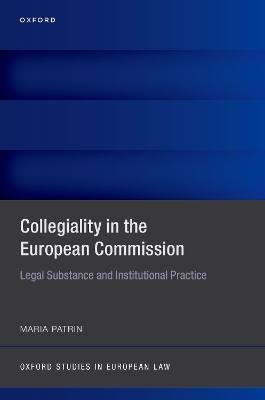
Collegiality in the European Commission
Oxford University Press (Verlag)
978-0-19-887372-3 (ISBN)
Collegiality is a core legal principle of the European Commission's internal decision-making, acting as a safeguard to the Commission's supranational character and ensuring the Commission's independence from EU Member States. Despite collegiality's central role within the Commission, its legal and political implications have remained critically underexamined. Collegiality in the European Commission sheds light on this crucial aspect of the Commission's work for the first time. In this novel study on collegiality, Maria Patrin proposes an innovative framework for assessing the Commission's institutional role and power. The book's first part legally examines collegiality, retracing collegial procedures and actors in different layers of decision-making — from the Commission's services to the College of Commissioners. The second part of the book explores the implementation of collegiality through illustrative case studies, focusing on various Commission functions including legislative initiative, infringement proceedings, and economic governance.
Partin's empirical analysis unveils a disconnect between the legal notion of collegiality and its concrete application in institutional practices. These variations raise normative questions on how to ensure the unity of the Commission as a collegial body despite the diversification of decision-making functions. They also invite a re-examination of the Commission's multifaceted role in the current EU institutional, legal, and political setting. Adopting an interdisciplinary approach that delves into both the legal substance and the political-institutional practice of collegiality, this book offers a unique, behind-the-scenes insight into the Commission's decision-making processes, furthering our understanding of the EU's institutional system.
Maria Patrin is a lecturer and research fellow at the University of Florence. She holds an LLM and a PhD in law from the European University Institute (EUI) and a postgraduate master's degree from the College of Europe in Bruges. She has been Research Associate at the Academy of European Law and at the Robert Schuman Centre for Advanced Studies of the EUI. Her main research interests lie in EU institutional law, EU legal history, and EU integration. Prior to her academic career, Dr Patrin worked for several years in Brussels as a Director in the EU Public Affairs Agency, Grayling.
Introduction
1: The Collegial Governance of the European Commission
Part I: The Legal Substance of the Principle of Collegiality
2: Origins and Evolution of Collegiality in the Commission
3: The Legal Sources of Collegiality Between Legal Rules and Institutional Practices
4: The Legal Nature of the Principle of Collegiality: What Kind of Principle?
5: Collegiality in the Making: The Actors on Stage and Behind the Scenes
Part II: The Institutional Practice of the Principle of Collegiality
6: Internal Decision Making and Functional Fragmentation
7: Legislative Initiative: The Revision of The Posting of Workers Directive
8: Executive Rulemaking: The Approval of Glyphosate
9: The Commission as the Watchdog of EU Law: Competition and Infringements
10: The Commission's Functions in Economic Governance
Conclusions
11: Collegiality: The Commission's Holy Grail?
| Erscheinungsdatum | 12.12.2023 |
|---|---|
| Verlagsort | Oxford |
| Sprache | englisch |
| Maße | 165 x 240 mm |
| Gewicht | 688 g |
| Themenwelt | Recht / Steuern ► EU / Internationales Recht |
| Recht / Steuern ► Öffentliches Recht | |
| Sozialwissenschaften ► Politik / Verwaltung ► Europäische / Internationale Politik | |
| ISBN-10 | 0-19-887372-7 / 0198873727 |
| ISBN-13 | 978-0-19-887372-3 / 9780198873723 |
| Zustand | Neuware |
| Informationen gemäß Produktsicherheitsverordnung (GPSR) | |
| Haben Sie eine Frage zum Produkt? |
aus dem Bereich


